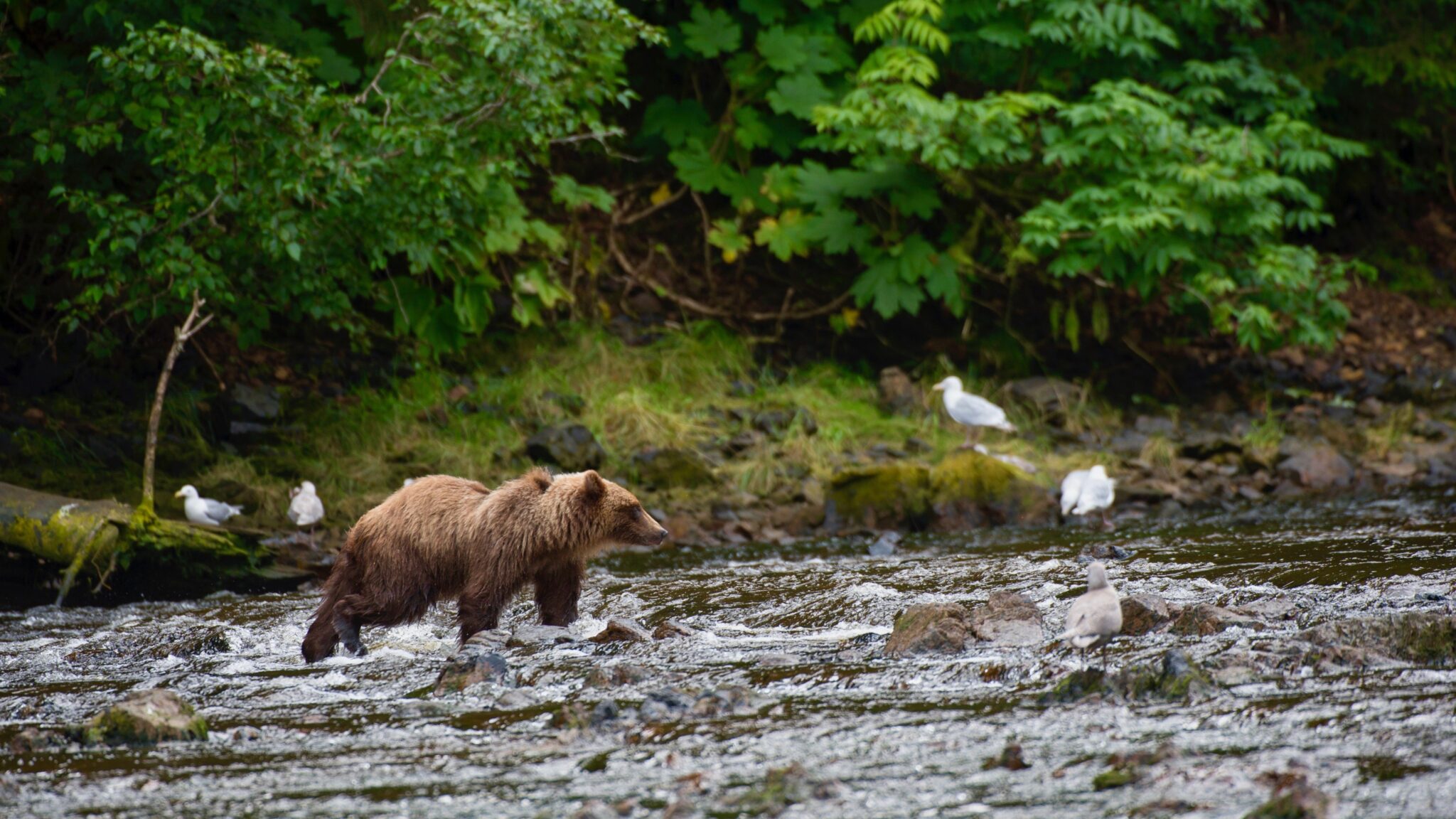
Trump Admin Moves Closer to Slashing Protections for World’s Largest Temperate Rainforest

Brown bear fishing for salmon in creek at Pavlof Harbor in Tongass National Forest, Alaska. Wolfgang Kaehler / LightRocket / Getty Images
The Trump administration has moved one step closer to opening Earth’s largest intact temperate rainforest to logging.
On Tuesday, the U.S. Department of Agriculture’s Forest Service announced it would draft an environmental impact statement exempting Alaska’s Tongass National Forest from the 2001 Roadless Rule, which prohibits road construction and timber harvesting on 58.5 million acres of National Forest land. The administration’s proposal would open more than half of the Tongass National Forest’s 16.7 million acres to logging, The Washington Post reported.
Environmental advocates immediately raised the alarm about the proposal. The Tongass is an important habitat for wildlife, including salmon, and an important tool for fighting the climate crisis. It stores around 8 percent of all the carbon sequestered in U.S. national forests in the lower 48 states, Earthjustice pointed out.
BREAKING: The Trump administration just issued a plan to slash protections across 9 million acres of the Tongass National Forest, paving the way for old-growth clear-cuts in Alaska's cherished temperate rainforest. https://t.co/jR8WrQaaql
— Earthjustice (@Earthjustice) October 15, 2019
“The world’s largest remaining intact temperate rainforest containing vital old-growth trees is under attack because of efforts to undo the Roadless Rule,” Osprey Orielle Lake, Executive Director of Women’s Earth and Climate Action Network (WECAN), told Earthjustice. “The Tongass Rainforest of Alaska — the traditional homelands of the Tlingit, Haida, and Tsimshian Peoples — has been called ‘the nation’s climate forest’ due to its unsurpassed ability to sequester carbon and mitigate climate impacts.”
The Washington Post first reported that the Trump administration would seek to open the forest to development in August, and President Donald Trump himself has asked Secretary of Agriculture Sonny Perdue to exempt the forest from logging limits. In doing so, he acted in accordance with the wishes of Alaska’s Republican congressional delegation, who has asked him to open up the forest.
“As Alaskans know well, the Roadless Rule hinders our ability to responsibly harvest timber, develop minerals, connect communities, or build energy projects to lower costs — including renewable energy projects like hydropower, all of which severely impedes the economy of Southeast,” Sen. Dan Sullivan (R-Alaska) said in a statement reported by The Washington Post.
However, the Post noted that timber provides less than one percent of southeast Alaska’s jobs. Seafood processing, on the other hand, provides eight percent and tourism 17 percent. Around 40 percent of West Coast wild salmon spawn in the Tongass.
“The push for an Alaska-specific roadless rule has always been just pretext for continuing to subsidize Southeast Alaska’s old-growth timber industry, and it will do so at the expense of recreation and fishing, Native communities, and wildlife,” Andy Moderow, Alaska director at Alaska Wilderness League, said in the Earthjustice press release.
BREAKING: new @forestservice proposal would undermine law that protects the Tongass National Forest from logging, road-building and other development. Logging and roads don't belong in our wildest forests–period. RT to #ProtectTheTongass #SaveRoadless pic.twitter.com/rpyAukB3H1
— Alaska Wilderness League (@alaskawild) October 15, 2019
Alaska’s native communities also spoke out against the proposed change.
“You know it’s sad that we have to continue to fight our own government to protect our forests and streams,” President of the Organized Village of Kake Joel Jackson told Alaska’s Energy Desk, as NPR reported.
He said his community, which relies on the Tongass for food, may sue the Forest Service.
The Forest Service proposal offers six possibilities for the Tongass. The least extreme would mean leaving protections as they are and the most extreme would mean opening all 9.2 million currently roadless acres. The latter is what the Forest Service says it prefers, according to NPR.
An additional 5.7 million acres of the forest have been designated as wilderness by Congress and are therefore safe from any development, The Washington Post reported.
- Trump Moves to Open 1.5 Million Acres of Alaskan Refuge for Oil ...
- Trump Pushed for Mining Project That Could Destroy Alaska Salmon ...
- Trump Administration to Allow Logging in Pristine National Forest - EcoWatch
- Trump to Remove Protections for Tongass National Forest, the 'Lungs of North America' - EcoWatch

 233k
233k  41k
41k  Subscribe
Subscribe 